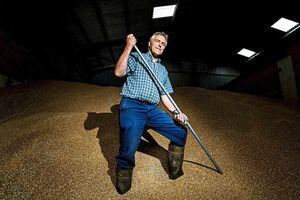Ideal weather brings bumper crop yields for Shropshire
A perfect balance of sun and rain has left Shropshire farmers reaping record crop hauls this year.

Growers are celebrating "exceptional" yields in most grain crops which may eclipse previous records.
The reasons behind the bumper harvest are yet to be fully explained, but may be a combination of ideal growing conditions and action by farmers to control weeds, pests and disease.
In different parts of the country, two farmers have lodged claims with the Guinness Book of Records to have broken international yield records.
And the annual crop survey by the NFU has now revealed a six per cent rise in the wheat yield, demonstrating the strength of performance during a year of great growing conditions.

Luke Ryder, the NFU's regional combinable crops board spokesman, said "This year's Shropshire harvest was disrupted by rain and some slower crop development but we saw exceptional yields in most grain and oilseed crops, coupled with good quality.
"While the yields are not fully explained yet, it could partly be as a result of county farmers keeping on the front foot managing weeds, disease and crop pests while crops were developing.
"Crop physiologists have suggested the exceptionally bright but cool weather across England in the spring and early summer helped.
"Currently, national average yields across the main combinable crop species could be at the top end of those seen in the past 10 years, possibly at record levels."
However, consecutive good harvests have left an oversupply of products around the world, while falling demand in China has dampened demand.
That in turn has led to a dramatic fall in prices over the last two years, putting them below the cost of production.
"Small increases in yield though are not sufficient to cover dramatic falls in cereal and oilseed prices," Mr Ryder added.
Shropshire farmer Adrian Joynt, who manages the 2,500-acre Apley Estate between Bridgnorth and Telford and grows barley, wheat, oats and oilseed rape, agreed.
"Weather conditions right from the minute we drilled the crops last autumn have been good," he said. "The crops established well, had a good root system, and that kept on through the spring.
"This year, I would think from talking to people in general, will be up there with the best of them."
But he added: "I don't think people will be worse off or better off for the better yield – it's just compensating for the low price – and I don't see any great change for a couple of years.
"The world had good harvests this year and stocks are at one of their highest levels ever."
And Rob Alderson, a grower near Craven Arms, added: "The prices are under pressure so at least we have had a chance. The summer was ideal. There was enough sunshine and moisture – it all ran nicely and came together.
"There was a bit of pressure during the combining because the windows were a bit narrow, but it definitely worked out."
The total UK wheat production has now been estimated at 16.68 million tonnes for 2015, beating last year's figure of 16.61 million tonnes, reflecting a record-breaking 9.1 per hectare average yield.
Winter barley production rose by four per cent to 7.5 tonnes per hectare, the NFU's crop report showed, well above the 10-year average of 6.5 tonnes.
The spring barley yield stands at 5.9 tonnes per hectare, a similar figure to last year but above the 10-year average of 5.4 tonnes.
And oilseed rape yield is 3.8 tonnes per hectare, beating last year's figure of 3.6 tonnes/hectare by 5.5 per cent, and also topping the 10-year average of 3.4 tonnes, but below the 3.9 average achieved in 2011.
Mike Hambly, NFU combinable crops board chairman, said that the record yields appeared to paint an optimistic picture for arable farming, albeit with some issues remaining.
"It is great news to see the nation has had such a successful harvest for wheat. However, in a global context we have seen a sequence of good harvests and grain stocks are currently comfortable," he said.
"Cereal prices are global and like most commodities are currently low. For example, we've already seen prices taking a 30 per cent tumble over the past two years, similar to our friends in the dairy sector, and costs of production staying put."





